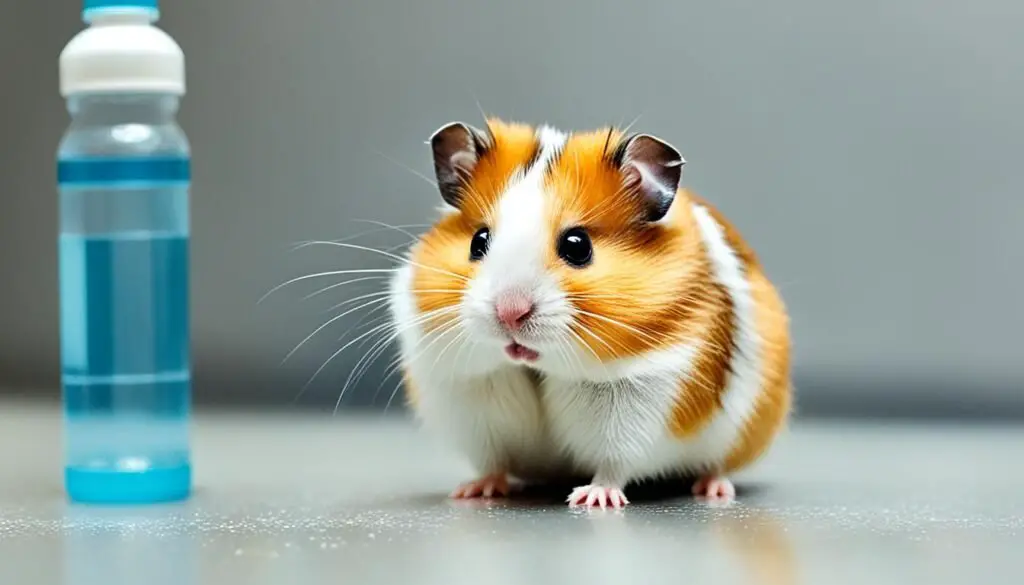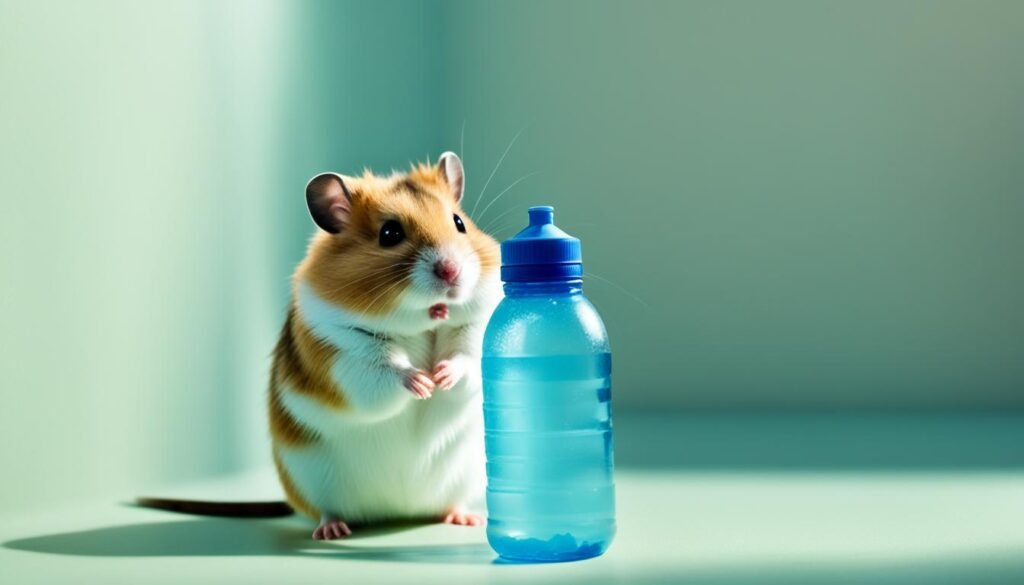If you’re a concerned hamster owner, you may have noticed that your Syrian hamster is not drinking water as much as you would expect. It’s not an uncommon issue, as studies have shown that a staggering 33% of Syrian hamsters suffer from dehydration due to inadequate water intake. This raises the question: why is your hamster not drinking enough water?
Proper hydration is vital for your hamster’s overall health and well-being. Dehydration can lead to serious health complications and even be life-threatening if left untreated. As a responsible pet owner, it’s essential to understand the reasons behind your hamster’s reluctance to drink and take appropriate measures to address the issue.
In this article, we will explore the possible causes of a Syrian hamster not drinking water and provide strategies to encourage hydration. We will also discuss the signs of dehydration to help you identify whether your hamster is at risk. Let’s dive in and ensure your furry friend stays properly hydrated for a happy and healthy life!
Signs of Dehydration in Syrian Hamsters
It is essential to recognize the signs of dehydration in your Syrian hamster. These can include:
- Droopy and sunken eyes: Dehydration can cause your hamster’s eyes to appear dull, saggy, and less vibrant.
- Ruffled fur: A dehydrated hamster may have fur that looks unkempt and rough, lacking its usual smooth and glossy texture.
- Weight loss: Noticeable weight loss may be an indication that your hamster is not getting enough fluids.
- Decreased grooming: Dehydration can lead to a decrease in grooming behavior, resulting in a disheveled appearance.
- Slower movements: Dehydrated hamsters may exhibit sluggishness and reduced activity levels.
- Irritability: A dehydrated hamster may become more irritable and agitated than usual.
- Confusion: Disorientation and confusion can be signs that your hamster is experiencing dehydration.
- Concentrated urine with a strong odor: Dehydration can cause the urine to become more concentrated and emit a strong smell.
While these symptoms may not definitively indicate dehydration, they are clear indicators that your hamster is unwell and requires proper treatment.

Possible Causes for a Syrian Hamster Not Drinking Water
If you notice that your Syrian hamster is not drinking water, it’s important to identify the possible causes. Understanding these reasons can help you take the necessary steps to ensure your hamster’s hydration.
- Stress: Syrian hamsters are sensitive creatures, and they can easily become stressed in new environments or due to changes in their surroundings. This stress can affect their drinking habits and lead to decreased water intake.
- Malfunctioning Water Bottle: A faulty water bottle can prevent your hamster from accessing water, even if it’s available. It’s essential to regularly check and clean the water bottle to ensure it’s functioning properly. If necessary, replace the water bottle to ensure your hamster has access to fresh water at all times.
- Underlying Health Condition: In some cases, a Syrian hamster not drinking water may be a symptom of an underlying health issue. If you have ruled out stress and issues with the water bottle, it’s important to monitor your hamster for any other signs of illness and consult a veterinarian if necessary.
By addressing these possible causes, you can help encourage your Syrian hamster to drink water and ensure their overall well-being.
 Note: the image above is for illustrative purposes only and may not directly depict a Syrian hamster.
Note: the image above is for illustrative purposes only and may not directly depict a Syrian hamster.
Strategies to Encourage Your Syrian Hamster to Drink Water
If you notice that your Syrian hamster is not drinking water, there are several strategies you can try to encourage them to drink and ensure their hydration. Here are some tips:
- Refresh the water supply: Ensure that the water in your hamster’s bottle is fresh and at room temperature. Hamsters may be more inclined to drink water that is clean and has no unusual smell.
- Check the water bottle: Make sure that the water bottle is functioning properly. Check for any blockages or leaks that may prevent your hamster from accessing water. Clean the bottle regularly to remove any bacteria or algae buildup.
- Experiment with different water bottles: Some hamsters may have preferences for certain types of water bottles. Try using different designs and materials to see which one your hamster prefers. The key is to provide a bottle that is easy for them to use and access water from.
- Reduce stress: Stress can impact a hamster’s drinking habits. Ensure that your hamster’s environment is calm, quiet, and free from disturbances. Create a safe and secure space where they feel comfortable and at ease.
Implementing these strategies can help stimulate your Syrian hamster’s natural drinking behavior and ensure that they are adequately hydrated. Remember, proper hydration is essential for your hamster’s overall health and well-being.
Rehydration Methods for Dehydrated Syrian Hamsters
If you suspect your Syrian hamster is dehydrated, it is essential to take immediate action to rehydrate them. Dehydration can have severe consequences for your furry friend’s health and well-being. Here are some effective rehydration methods you can try:
- Offer rehydration fluids by mouth: Start by gently offering small amounts of rehydration fluids using a syringe. This method ensures that your hamster gets the necessary fluids directly into their system. It is crucial to use a rehydration product specifically designed for small animals, as it contains the right balance of salts and sugars. These products can be found at your local pet store or obtained from your veterinarian.
- Monitor hydration levels: After administering rehydration fluids, closely monitor your hamster’s hydration levels. You can do this by assessing their overall behavior, energy levels, and urine output. Signs of improvement may include increased activity, alertness, and normal urine color and consistency.
- Seek veterinary assistance: If your hamster’s dehydration persists or worsens even after offering rehydration fluids, it is crucial to seek veterinary assistance. A veterinarian will be able to provide more advanced dehydration treatment and further examine your hamster for any underlying health conditions that may be contributing to their dehydration.
Remember, timely rehydration is essential for your hamster’s health. If you notice any signs of dehydration or a refusal to drink water, take proactive steps to address the issue promptly.
Preventative Measures for Ensuring Your Syrian Hamster’s Hydration
To ensure your Syrian hamster stays hydrated, it’s crucial to take preventative measures. One of the main things to check is their water bottle. Regularly ensure it is full and functioning correctly, without any blockages or leaks. A faulty water bottle can prevent your hamster from accessing the water they need to stay hydrated.
In addition to a well-functioning water bottle, provide your hamster with a balanced diet that includes fresh produce like cucumbers and apples. These fruits and vegetables have a high water content and can contribute to your hamster’s overall hydration.
Remember to keep your hamster’s environment cool and well-ventilated, especially during hot summer months. Excessive heat can lead to dehydration and put your hamster’s health at risk. By maintaining a comfortable temperature, you can help prevent heatstroke and promote optimal hydration for your furry friend.
